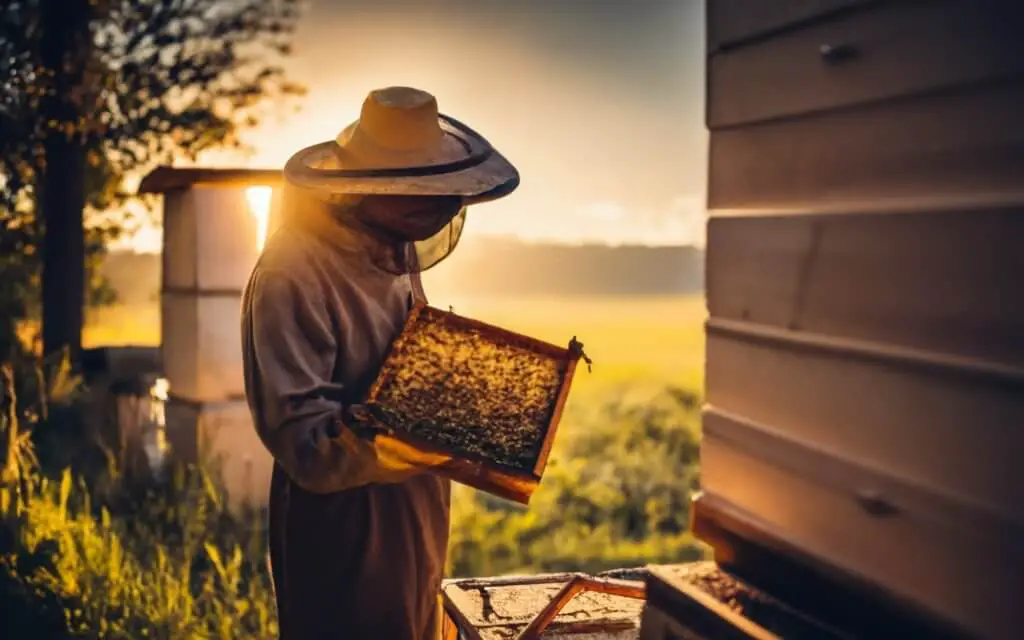I’m a hobby beekeeper who’s been at it now for probably close to 10 years. It all started when my wife bought me a beginner’s hive setup as an anniversary gift – and I was hooked! While I love caring for bees more than just about any hobby I’ve taken up, I’m also the first to admit it comes with some very real and ongoing challenges. I wanted to share a bit about my experiences as a beekeeper, including some of those demanding parts that newbies should go into the hobby understanding fully. Because as rewarding as beekeeping is, it’s far from a walk in the park!

The Constant Battle to Maintain Healthy Hives
Hands down one of the most difficult aspects of beekeeping for me has been dealing with the myriad diseases, mites, hive beetles, bacterial infections, and other critters that can attack and weaken or totally kill off a colony if left unchecked. Varroa mites, American foulbrood, European foulbrood, Nosema – it seems like every year there’s a new microscopic menace threatening my hives! As a diligent beekeeper, I’ve had to become pretty darn proficient at continually monitoring for any signs of hive health issues, running frequent diagnostic tests on things like honey bee gut health, strategically applying both natural and medicinal treatments at the right times preventatively or curatively, providing supplemental feeding when warranted, and constantly using integrated pest management techniques to keep these endless issues at bay to the extent I can.
Even with all the inspection, treatments, modifications, and interventions I regularly employ, it seems inevitable that at least a couple times each season, some destructive mite infestation, bacterial infection, virus, or other disease still manages to take hold and spread in a hive before I can get it fully under control. No amount of effort and expenditure seems capable of shielding the bees from every single threat year after year. Watching a once vigorously healthy colony rapidly collapse is utterly heartbreaking for a beekeeper who feels deeply responsible for the lives of the fascinating creatures in their care. Recovering emotionally and motivationally from the loss of entire mature hives that at one time produced towering honey frames full of bees takes time. Moping extensively over each failure isn’t constructive of course – but that doesn’t make it sting any less when a colony you’ve nurtured for years finally succumbs.
For me, the battle to keep ahead of everything that can ail a hive never halts as a beekeeper. There’s always more for me learn about protecting bee health through classes, experienced mentors, trade publications, online groups, and trial-and-error. Having access to others who understand the frustrations that come from diseases damaging seemingly thriving hives helps lessen the sense of disappointment at losses. Ultimately, some amount of attrition is inevitable in beekeeping. But through continuous education and evolution in techniques, a diligent beekeeper can at least try to minimize harm and maximize the healthy years of their colonies. It’s an endless challenge though, that’s for sure!
Coping With the Discouragement of Swarming Season
On the topic of warm-weather beekeeping frustrations, another huge contributor to my occasional headaches as a conscientious honey-producing beekeeper is managing colonies’ strong natural reproductive urge each spring to cast off new reproductive swarms, inevitably decreasing honey production temporarily. Despite my very best efforts to meticulously monitor for signs of swarm prep and take every recommended step like strategically splitting robust hives ahead of time, carefully checking daily for telltale swarm queen cells and destroying them, maximizing space for incoming nectar, harvesting early honey frames for extra room, and providing maximal ventilation, it still never fails that at least a couple of my mature hives each season decide to take off in a swarm each spring regardless, usually landing in a nearby tree branch or bush.
Watching thousands of your hard-working forager bees abscond with the queen herself during the peak weeks of honey production can be pretty demoralizing, knowing it severely reduces that hive’s workforce and therefore nectar harvesting potential for weeks or longer as the new virgin queen matures, mates, returns, and slowly begins laying again. When conditions align favorably in the bees’ favor, their natural instincts to reproduce simply override any swarm prevention efforts I as a mere human beekeeper can employ. Finding those clusters and recapturing swarms helps reduce losses, but often they scatter to parts unknown never to be recovered. After long nights anxiously watching hives for signs of swarm prep, it still happens. All I can really do is shrug, rebuild the reduced hives, and try to prevent it better next year, knowing I will likely never fully outsmart honey bee reproductive urges that have evolved over millennia.
Handling Defensive and Sting-Prone Colonies
An additional unavoidable aspect of beekeeping I’ve had to get comfortable with is the varying temperaments between different colonies, ranging from extremely gentle and nearly pacifistic, to aggressively defensive and sting-happy without much provocation. A beekeeper quickly learns not to anthropomorphize their colonies’ behaviors – when a hive appears angry and jittery, there’s some underlying stressor or queen issue provoking it, not a case of the bees holding a grudge!
But dealing with overly “hot” hives that sting with minimal disturbance is just an unavoidable reality. Getting stung occasionally comes with the beekeeping territory under the best conditions. But keeping overly defensive colonies around significantly increases that occupational risk to uncomfortable levels. Luckily, careful requeening of excessively ornery hives with specialized gentle and tolerant queen breeds usually helps restore some zen to disagreeable colonies. But requeening can take weeks, so meanwhile handling the easily provoked hives means donning an extra layer of clothing and protective gear when inspecting them until their demeanor hopefully dials down. Not fun, but just part of the learning curve!

Additional Challenges, From Equipment Costs to Selling Harvested Honey
There are of course dozens of other difficult aspects that go part and parcel with the passionate hobby of beekeeping. The substantial initial and ongoing costs of quality hives, safety equipment, medications, colony losses, and more quickly add up. Personally recovering from the rare but demoralizing event of entire hives being vandalized or stolen. The very real physical demands of lifting heavy supers, working long hours on your feet, hauling loads, and performing other repetitive labor that slowly takes a toll. The additional skills of effectively marketing and profiting from hive products like honey, beeswax, pollen and propolis through niche entrepreneurs ship and quality branding. Figuring out safe locations away from insecticides yet offer rich foraging. And so much more…the learning curve of challenges never seems to fully plateau!
Luckily there are more educational opportunities than ever today for budding beekeepers through online groups, videos, magazines, and local clubs full of veterans willing to mentor the next generation. Their guidance and communal support makes overcoming the myriad hurdles inherent to beekeeping more achievable. We’ve all been beginners ourselves once, and understand the types of mistakes, frustrations, stresses, and obstacles that confront hive stewards starting out. My advice to any aspiring apiarist is to seek out those communities and tap into their collective experiences if you hope to avoid stumbles. Beekeeping is an art and science with immense complexity, but mentors help smooth the path.
Why I’ll Never Give Up My Beekeeping Hobby, Troubles and All!
Despite the very real challenges and steep learning curve I outlined, I remain as passionately in love with beekeeping today as when I first began this journey years ago! To me, the sense of satisfaction from nurturing a colony of gentle honey makers from a 3 lb package all the way into a powerhouse hive bursting with activity is second to none. The meditative tranquility of sitting with a puff of smoke watching bees come and go, the intellectual stimulation of constantly learning their biology and behaviors, the sweet periodic rewards from honey and wax harvesting, and the simple joy of immersing oneself in nature’s cycles is a never-ending source of meaning, adventure and fascination in my life.
Sharing the uplifting experience with my kids and friends, seeing their own wonder around the hive, reminds me that a passion for pollinators goes far beyond just one hobbyist beekeeper alone. The bees need all the human allies they can get! There’s also no denying I feel an abiding sense of dutiful obligation to do my small part in sustaining these ecologically essential species that bless us all with agriculture. The headaches and hurdles have been well worth it.
In that sense, beekeeping seems much more than just another casual hobby – it becomes a defining lens through which you view your relationship to nature, food, and sustainability. That collectivist mindset keeps me resilient. The bees challenge me to rise above discomforts. If nothing else, the years have taught me patience and perseverance, if only for the fact that the bees need our help more than ever in a changing world. I hope anyone pondering a foray into beekeeping yourself found these impressions helpful. Don’t hesitate to reach out with any other questions raised! Despite the hassles involved, you may just find a new passion. Happy honey hunting!
